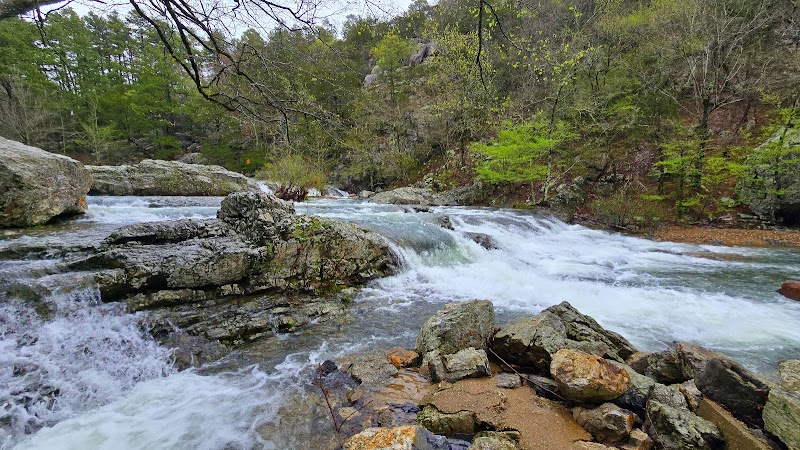Gravel & Grit: Bikepacking the Ouachita Triple Crown Route
The Ouachita Triple Crown Route calls bikepackers to traverse 134 miles of tough gravel trails, dense forests, and rocky ascents. This guide balances the thrill of adventure with practical tips to help you prepare for one of Arkansas’s most demanding and rewarding bikepacking experiences.
Trail Tips
Stay Hydrated and Carry a Filter
Water sources are intermittent along the route, so bring enough water and a lightweight filtration system to refill where available.
Choose Tire Tread Wisely
Opt for tires that grip loose gravel but don’t slow you down on smooth sections—balance is crucial for terrain versatility.
Plan for Weather Variability
Prepare for temperature swings and sudden winds by layering your clothing and monitoring forecasts before setting out.
Time Your Ride During Cooler Months
Spring and fall offer the best conditions with cooler temperatures and fewer biting insects. Summer heat can be brutal.
Gravel & Grit: Bikepacking the Ouachita Triple Crown Route
Bikepacking the Ouachita Triple Crown Route offers a rugged encounter with Arkansas’s wild heart—a 134-mile gravel loop demanding stamina and strategy. From dense forest corridors to rocky ridgelines, this trail is fiercely itself: raw, relentless, and rewarding.
The route stitches together three established trails—Ouachita National Recreation Trail, Warren Trail, and Talimena Scenic Drive—challenging riders with 14,000 feet of elevation gain. The terrain shifts constantly, with gravel crunching beneath tires, roots testing traction, and rivers daring you to find a balance between speed and control. Forests loom close, their pines whispering secrets, while expansive valleys stretch wide enough to catch your breath and shake off the grind.
Planning is key. Water sources, while present, can be sparse in stretches. Carry extra hydration options and a lightweight filtration system. Tires with moderate tread strike the right balance—a too-slick surface means trouble on loose gravel; too aggressive slows progress and tires you faster. Footwear should blend comfort and protection; think supportive but breathable.
Early spring and fall offer cooler temps and fewer bugs, ideal for longer days on the saddle. Summers push temperature highs that demand early starts and careful hydration. Winter’s unpredictability brings muddy sections and slick moss underfoot. Timing your trip around weather windows will enhance safety and enjoyment.
Pack layers. The Ouachita range plays with microclimates: sunlit ridges burn fierce while shaded hollows hold stubborn chill. Prepare for shifting conditions and sudden wind gusts that push and pull like the trail itself has moods.
This route isn’t about conquering but engaging—a dialogue with land that resists shortcuts. It rewards those attentive to its rhythm: steady climbs met with explosive descents, quiet moments alongside rattling streams, afternoons spent chasing the fading light through fir forests.
For bikepackers seeking a blend of technical challenge and scenic payoff, the Ouachita Triple Crown promises an immersive journey defined by gravel and grit. With preparation and respect, this is a ride where every mile earns its keep, every bend offers a new story, and the landscape presses you forward as much as you press your pedals.
Recommended Gear
Lightweight Water Filter
Vital for refilling from natural sources along the route, ensuring safe hydration.
null specific
Gravel-Specific Tires
Provide the necessary grip and durability across rocky and loose gravel sections.
null specific
Layered Clothing System
Adapts to varying temperatures and protects against wind and cold.
fall/winter specific
Bike Repair Kit
Includes tools for on-trail repairs—crucial for remote stretches with no immediate help.
null specific
Frequently Asked Questions
How long does it typically take to complete the Ouachita Triple Crown Route?
Most riders take between 3 to 6 days to complete the 134-mile loop, depending on fitness, bikepacking style, and daylight hours.
Are there campsites or shelters along the route?
Yes, the route passes multiple designated campsites, but some sections require backcountry camping, so bring appropriate gear and permits if needed.
What type of bike is best for this route?
A gravel bike or sturdy mountain bike with reliable tires for mixed terrain is recommended, balancing speed and durability.
Is navigation difficult on the Ouachita Triple Crown?
The trail is moderately marked, but GPS navigation or detailed maps are advised as intersections and alternate paths can cause confusion.
When is the best time of day to ride?
Early mornings offer cooler temperatures and calmer winds, while late afternoons provide softer light for resting and photography.
What wildlife might I encounter?
Expect to see white-tailed deer, wild turkeys, and a variety of songbirds. Black bears are present but typically avoid human contact.
Local Insights
Hidden Gems
- "Viewpoint at Rich Mountain offers panoramic vistas rarely crowded"
- "Secret spring-fed pools along the trail provide natural refreshment spots"
- "The less-traveled Skillet Fork Trail loop offers technical singletrack sections"
Wildlife
- "Eastern box turtles crossing gravel paths early morning"
- "Red-shouldered hawks nesting in tall pines"
- "Occasional sightings of elusive river otters near water crossings"
History
"The route crosses lands once traveled by Native American tribes and later served logging operations; remnants of historic cabins and rail grades peek through the forest."
Nearby Landmarks

Waterfall Wonder: Little Missouri Falls
Nestled in the enchanting Ouachita National Forest near Langley, Arkansas, Little Missouri Falls offers a captivating retreat for nature lovers....

Discover Crooked Creek Falls: Nature's Quiet Gem
Nestled in the serene countryside of Caddo Gap, Arkansas, Crooked Creek Falls offers an enchanting experience for nature lovers and adventurers...

Discover Talimena State Park
Talimena State Park, located in Talihina, Oklahoma, offers travelers a serene escape into nature’s lush embrace. As the starting gateway to the...

Lake Ouachita: A Jewel of Arkansas
Lake Ouachita, nestled in the heart of the Ouachita Mountains in Arkansas, is a stunning destination known for its crystal-clear waters and charming...